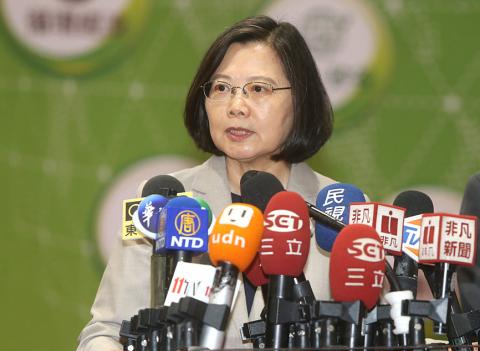President Tsai Ing-wen (蔡英文) yesterday demanded that Kaohsiung Mayor Han Kuo-yu (韓國瑜) retract his comparison of the nation’s military to a group of “eunuchs” for its “lack of laws.”
Han on Thursday had said in an interview that the nation’s military had no laws of its own, and therefore was “akin to eunuchs draped in Western suits.”
“Even if they wore Armani, they would still just be eunuchs,” he said.

Photo: CNA
Without laws, the military has no combat effectiveness, he said, adding that increasing the military’s budget would be a waste of time.
Tsai yesterday admonished Han, calling his statement “unjust.”
“As the commander-in-chief of the armed forces, I solemnly beseech Mayor Han, who has previously served in the military, to retract his statement,” Tsai said, adding: “What does the budget have to do with military laws?”
Laws were in 2013 amended to have most military legal cases handled by the civil court system, in response to public demand for reform following the death of army corporal Hung Chung-chiu (洪仲丘), who died of abuse at the hands of senior officers that year.
However, Taiwan still has military judges who would handle military cases in wartime, Tsai said.
As commander-in-chief, she could not let Han disparage the hard work of the men and women serving in the military, she said.
Only because the military is on call around the clock can the public live in safety and enjoy the freedoms that they have, she said.
Han yesterday defended his statement, saying that he was using a metaphor to call attention to the importance of military laws.
Tsai should not criticize him, as she has not served in the military, he said, adding that she should focus on boosting the military’s strength rather than tarnishing his name.
“If I retract everything Tsai tells me to, I would need to go all the way back to when I was still in my mother’s womb,” he said.
Tsai’s administration has continually bought additional weapons, but without laws, the military had no spirit or discipline, he said.

AGING: As of last month, people aged 65 or older accounted for 20.06 percent of the total population and the number of couples who got married fell by 18,685 from 2024 Taiwan has surpassed South Korea as the country least willing to have children, with an annual crude birthrate of 4.62 per 1,000 people, Ministry of the Interior data showed yesterday. The nation was previously ranked the second-lowest country in terms of total fertility rate, or the average number of children a woman has in her lifetime. However, South Korea’s fertility rate began to recover from 2023, with total fertility rate rising from 0.72 and estimated to reach 0.82 to 0.85 by last year, and the crude birthrate projected at 6.7 per 1,000 people. Japan’s crude birthrate was projected to fall below six,

US President Donald Trump in an interview with the New York Times published on Thursday said that “it’s up to” Chinese President Xi Jinping (習近平) what China does on Taiwan, but that he would be “very unhappy” with a change in the “status quo.” “He [Xi] considers it to be a part of China, and that’s up to him what he’s going to be doing, but I’ve expressed to him that I would be very unhappy if he did that, and I don’t think he’ll do that. I hope he doesn’t do that,” Trump said. Trump made the comments in the context

SELF-DEFENSE: Tokyo has accelerated its spending goal and its defense minister said the nation needs to discuss whether it should develop nuclear-powered submarines China is ramping up objections to what it sees as Japan’s desire to acquire nuclear weapons, despite Tokyo’s longstanding renunciation of such arms, deepening another fissure in the two neighbors’ increasingly tense ties. In what appears to be a concerted effort, China’s foreign and defense ministries issued statements on Thursday condemning alleged remilitarism efforts by Tokyo. The remarks came as two of the country’s top think tanks jointly issued a 29-page report framing actions by “right-wing forces” in Japan as posing a “serious threat” to world peace. While that report did not define “right-wing forces,” the Chinese Ministry of Foreign Affairs was

PREPAREDNESS: Given the difficulty of importing ammunition during wartime, the Ministry of National Defense said it would prioritize ‘coproduction’ partnerships A newly formed unit of the Marine Corps tasked with land-based security operations has recently replaced its aging, domestically produced rifles with more advanced, US-made M4A1 rifles, a source said yesterday. The unnamed source familiar with the matter said the First Security Battalion of the Marine Corps’ Air Defense and Base Guard Group has replaced its older T65K2 rifles, which have been in service since the late 1980s, with the newly received M4A1s. The source did not say exactly when the upgrade took place or how many M4A1s were issued to the battalion. The confirmation came after Chinese-language media reported